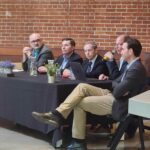AFF-San Francisco talks innovative opportunities for K-12 education
Criticism of the U.S. public school system and soaring college costs is nothing new. AF-San Francisco chapter leader Katie Modesitt wanted to take a different approach. She framed the discussion around what schooling can be. “It was an opportunity-based narrative, rather than criticizing the current system,” she voiced. The room was full of 20 and 30-somethings, many of whom are entrepreneurs. Most aren’t yet parents, but students and professionals who’ve made it through the traditional schooling system and among those who racked up piles of debt in the process.
The attendees were all in, like the mom who plans on founding her own school. Michael Strong, the founder of the Academy of Thought and Industry High School Network, and Danielle Strachman, a general partner at the 1517 Fund, facilitated the discussion on “Educational Entrepreneurship” and what can be done to improve K-12 education in San Francisco and across the country.
“There were a lot of questions about the educational ecosystem in San Francisco. Our education system is entirely lottery-based… we’re in a very hostile environment to charter schools,” said Modesitt. As advocates of school choice understand, vouchers allow students with special needs, or students living in underprivileged areas, to attend a school that meets their needs and points them toward success. AF-San Francisco didn’t stop there though and brought to question the teaching method itself.
Many expressed worry that public schools are one-size-fits-all, with no tolerance for typical childlike behavior. Since the establishment of the Department of Education in 1979, and the introduction of Common Core in 2009, this “standard” mentality has restricted the freedom of teachers in choosing teaching methods and material, leaving little choice but to “teach the test.”
Where to go from here? When Strong founded the Academy of Thought and Industry, he dealt with excessive zoning regulations in San Francisco and Austin. While he was eventually successful, cutting red tape would allow more innovation in the education industry. This could bring about a better way for individual students, and our society, to move forward into the future.
Students of the academy can choose between four tracks: art, business, tech, and academia. The goal is to help students determine and begin pursuing their interests before college. The academy’s website echos the theme of AF-San Francisco’s event: entrepreneurship and making your own way. It reads, “Teens that choose ATI are ready for responsibility and able to take ownership over their own education in a way that the control mechanisms of typical schooling make virtually impossible.”
Attendees recognized the changing economy in which the “old way” simply isn’t working anymore. “People don’t get a degree, and work at a company for that degree, and then climb the ladder – that’s not how the economy works anymore,” said Modesitt. This, combined with soaring costs, is slowly pushing parents and students to take the risk of trying something new.
The perception that pursuing nontraditional education is taking a risk is an issue in and of itself. Modesitt explained, “It really came down to changing the public perception of what schooling is. You can have great educational alternatives out there, but if people aren’t willing to take the risk and put their kids in an untraditional school, what’s the point?”
“We need to break down the stereotype that a college degree, or a traditional education is a ticket to the workforce,” said Modesitt.
You wouldn’t think this would be a difficult task, given the telling statistics. According to the Huffington Post, “Nearly 45 percent of recent college graduates are working in jobs that don’t require a bachelor’s degree.” That’s over 800,000 students who are doing what they could have done four years ago, but instead also have thousands of dollars in debt on their shoulders.
Despite the clear evidence that something must change, AF-San Francisco recognized that the discussion of alternatives needs to be had, and that the stigma around foregoing college remains.
In the new economy of constant innovation, the traditional education system is proving futile. “Learning isn’t just sitting in a classroom and taking tests and taking notes, but it’s a quest for information that’s going to guide you for the rest of your life,” said Modesitt. However, school doesn’t teach children to love learning.
As early education becomes a laborious task with 7-hour days and hours of homework, children graduate elementary school with no curiosity and little excitement for learning. College counselors make clear that the job market is slim without at least 2 years experience, on top of a degree that many students change at least 3 times.
Michael Strong said it best: “More than anything we need schools based on love. We need schools where people passionately love what they are doing, love what they are teaching, love what they are learning, where love is the essential element in interactions between students, teachers, and parents, and where everyone is joined by a passionate vision of excellence and human flourishing.”
The time to reevaluate how we treat and teach children in school is past due. Will you find a better way for children, or accept the status quo?




